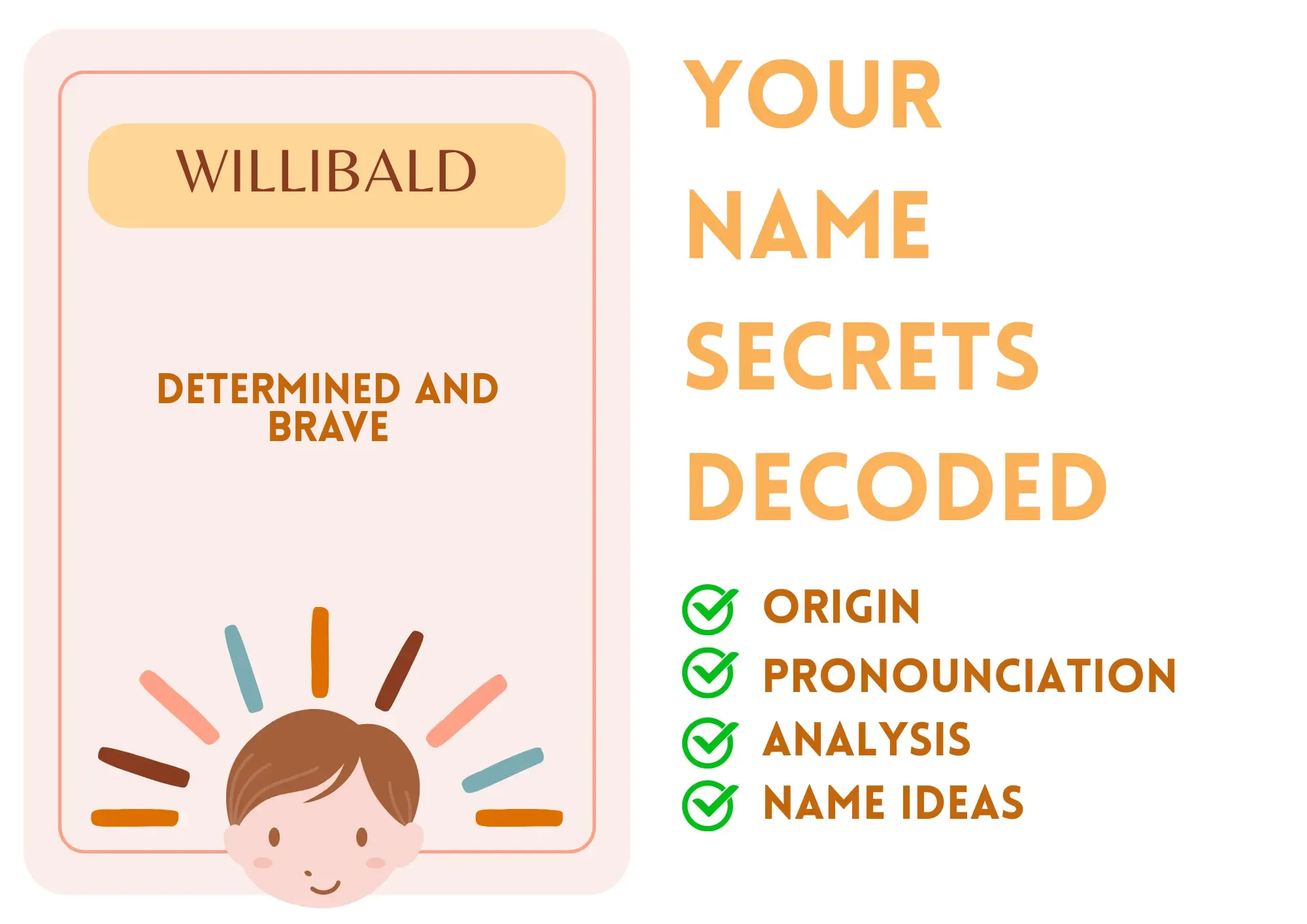
Willibald
Willibald is a traditionally Germanic name that combines the elements 'willi,' meaning 'determination' or 'will,' and 'bald,' meaning 'bold' or 'brave.' This name reflects a strong character and resolute spirit, which resonates deeply within German culture.
Historically, Willibald has been used primarily for males, though its rare usage might allow for unisex application in modern contexts. The name has religious significance in Christianity, attributed to Saint Willibald, an English bishop and one of the first missionaries to Bavaria.
Due to its historical roots and charming vintage aura, Willibald is appreciated for evoking a sense of strength and tradition. It might be less common, but those who bear it or choose it for their children often find it unique and endearing.
Basic Information
Gender: Boy
Sounds Like: VIL-ee-bald
Pronunciation Explanation: The name is pronounced with emphasis on the first syllable 'VIL', followed by a soft 'ee' sound, and concluding with 'bald' pronounced as in 'bald eagle'.
Summary and Meaning
Meaning: determined and brave
Origin: Germanic origin, stemming from historical and cultural roots in DACH countries (Germany, Austria, Switzerland).
Usage: Willibald is primarily a male name, though it is rare and can be considered unisex due to its unique sounding aspects.
Name Number (Chaldean)
Name Number (Pythagorean)
Popularity (Global Rank)
Overall: 64093
Boys: 54235
Most Popular in
Religious and Cultural Significance
Religion: Christian
Background: In Christian tradition, the name is associated with Saint Willibald, who played a significant role in the early Church and missionary work.
Cultural Significance: The name Willibald carries a sense of historical resonance, often linked to tales of valor and determination. It remains a rare yet distinguished name in modern times.
Historical Significance: Willibald is historically significant as it references Saint Willibald, who was notable for his missionary work in Bavaria during the 8th century, thereby establishing a cultural connection to early Christian heritage in Europe.
Popular Culture
Literature and Mythology: While not commonly used in contemporary literature, Willibald may appear in historical narratives or folklore pertaining to the lives of saints and their missions.
Movies and Television: The name itself does not frequently appear in modern movies or television; however, it could potentially be adapted for characters in historical dramas or fantasy settings.
Feelings and Perceptions
Perception: Willibald is often perceived as unique, vintage, and strong. It carries a dignified weight due to its historical and cultural connotations, evoking admiration for its rarity.
Positive Feelings: Unique, strong, traditional, historic.
Negative Feelings: Might be considered outdated or unfamiliar to some contemporary audiences.
Practical Considerations
Ease of Writing and Calling: Willibald is moderately easy to write, however, its length (8 letters) and less common usage might lead to occasional mispronunciation or misspelling.
Common Typos and Misspellings: Willibaldt,Willibad,Willibolt,Willibal,Williwald
Common Nicknames: Will,Billy,Willy
Willibald Popularity
Willibald Usage and Popularity By Country
| Country | Rank (Overall) |
|---|---|
| Saint Lucia | 2431 |
| Germany | 2760 |
| Honduras | 5427 |
| Nicaragua | 7828 |
| Switzerland | 9684 |
| Ghana | 20757 |
| United Arab Emirates | 42863 |
| Peru | 43129 |
| Belgium | 48129 |
| Spain | 63520 |
Willibald Usage and Popularity By City
| City | Rank (Overall) |
|---|---|
| Nuremberg | 838 |
| Munich | 2365 |
| Mannheim | 869 |
| Dresden | 1231 |
| Saarbrucken | 921 |
| Berlin | 7241 |
| Stuttgart | 4137 |
| Frankfurt Am Main | 4742 |
| Haina | 1530 |
| Frankfurt | 3466 |
Compatibility Analysis
Famous Persons Named Willibald
-
-
-
-
Willibald Ruttensteiner
Born: November 12, 1962 - Steyr
association football player | association football coach
-
-
-
-
-
-
Related Names
Similar Sounding Names:
Waldemar,Wilbur,Wilfred,Willem